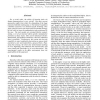Free Online Productivity Tools
i2Speak
i2Symbol
i2OCR
iTex2Img
iWeb2Print
iWeb2Shot
i2Type
iPdf2Split
iPdf2Merge
i2Bopomofo
i2Arabic
i2Style
i2Image
i2PDF
iLatex2Rtf
Sci2ools
MVA
2007
2007
Semi-supervised Incremental Learning of Manipulative Tasks
For a social robot, the ability of learning tasks via human demonstration is very crucial. But most current approaches suffer from either the demanding of the huge amount of labeled training data, or the limited recognition cabability caused by very domain-specific modeling. This paper puts forward a semi-supervised incremental strategy for the robot to learn the manipulative tasks performed by the user. The task models are extended Markov models, taking a set of pre-learned object-specific manipulative primitives as basic states. They can be initialized with few labeled data, and updated continously when new unlabeled data is available. Furthermore, the system also has the capability to reject unlabeled observation as unseen tasks and detect a new task model from a group of them. Thus, using this strategy, the robot only needs human teaching at every beginning, then elaborate the learned tasks, and even extend task knowledge by its own observation. The experimental results in an of...
Computer Vision | Manipulative Tasks | MVA 2007 | Semi-supervised Incremental Strategy | Task Model |
Related Content
| Added | 30 Oct 2010 |
| Updated | 30 Oct 2010 |
| Type | Conference |
| Year | 2007 |
| Where | MVA |
| Authors | Zhe Li, Sven Wachsmuth, Jannik Fritsch, Gerhard Sagerer |
Comments (0)

